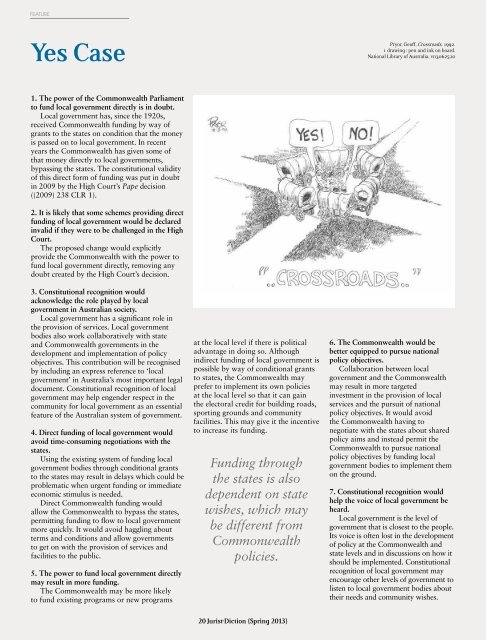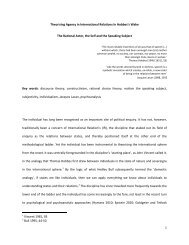PeoPLe, PoLicieS And PLebiSciteS: reforming the conStitution
PeoPLe, PoLicieS And PLebiSciteS: reforming the conStitution
PeoPLe, PoLicieS And PLebiSciteS: reforming the conStitution
You also want an ePaper? Increase the reach of your titles
YUMPU automatically turns print PDFs into web optimized ePapers that Google loves.
feature<br />
feature<br />
Yes Case<br />
Pryor, Geoff, Crossroads, 1992.<br />
1 drawing : pen and ink on board.<br />
National Library of Australia, vn3062520<br />
No Case<br />
1. The power of <strong>the</strong> Commonwealth Parliament<br />
to fund local government directly is in doubt.<br />
Local government has, since <strong>the</strong> 1920s,<br />
received Commonwealth funding by way of<br />
grants to <strong>the</strong> states on condition that <strong>the</strong> money<br />
is passed on to local government. In recent<br />
years <strong>the</strong> Commonwealth has given some of<br />
that money directly to local governments,<br />
bypassing <strong>the</strong> states. The constitutional validity<br />
of this direct form of funding was put in doubt<br />
in 2009 by <strong>the</strong> High Court’s Pape decision<br />
((2009) 238 CLR 1).<br />
2. It is likely that some schemes providing direct<br />
funding of local government would be declared<br />
invalid if <strong>the</strong>y were to be challenged in <strong>the</strong> High<br />
Court.<br />
The proposed change would explicitly<br />
provide <strong>the</strong> Commonwealth with <strong>the</strong> power to<br />
fund local government directly, removing any<br />
doubt created by <strong>the</strong> High Court’s decision.<br />
3. Constitutional recognition would<br />
acknowledge <strong>the</strong> role played by local<br />
government in Australian society.<br />
Local government has a significant role in<br />
<strong>the</strong> provision of services. Local government<br />
bodies also work collaboratively with state<br />
and Commonwealth governments in <strong>the</strong><br />
development and implementation of policy<br />
objectives. This contribution will be recognised<br />
by including an express reference to ‘local<br />
government’ in Australia’s most important legal<br />
document. Constitutional recognition of local<br />
government may help engender respect in <strong>the</strong><br />
community for local government as an essential<br />
feature of <strong>the</strong> Australian system of government.<br />
4. Direct funding of local government would<br />
avoid time-consuming negotiations with <strong>the</strong><br />
states.<br />
Using <strong>the</strong> existing system of funding local<br />
government bodies through conditional grants<br />
to <strong>the</strong> states may result in delays which could be<br />
problematic when urgent funding or immediate<br />
economic stimulus is needed.<br />
Direct Commonwealth funding would<br />
allow <strong>the</strong> Commonwealth to bypass <strong>the</strong> states,<br />
permitting funding to flow to local government<br />
more quickly. It would avoid haggling about<br />
terms and conditions and allow governments<br />
to get on with <strong>the</strong> provision of services and<br />
facilities to <strong>the</strong> public.<br />
5. The power to fund local government directly<br />
may result in more funding.<br />
The Commonwealth may be more likely<br />
to fund existing programs or new programs<br />
at <strong>the</strong> local level if <strong>the</strong>re is political<br />
advantage in doing so. Although<br />
indirect funding of local government is<br />
possible by way of conditional grants<br />
to states, <strong>the</strong> Commonwealth may<br />
prefer to implement its own policies<br />
at <strong>the</strong> local level so that it can gain<br />
<strong>the</strong> electoral credit for building roads,<br />
sporting grounds and community<br />
facilities. This may give it <strong>the</strong> incentive<br />
to increase its funding.<br />
Funding through<br />
<strong>the</strong> states is also<br />
dependent on state<br />
wishes, which may<br />
be different from<br />
Commonwealth<br />
policies.<br />
6. The Commonwealth would be<br />
better equipped to pursue national<br />
policy objectives.<br />
Collaboration between local<br />
government and <strong>the</strong> Commonwealth<br />
may result in more targeted<br />
investment in <strong>the</strong> provision of local<br />
services and <strong>the</strong> pursuit of national<br />
policy objectives. It would avoid<br />
<strong>the</strong> Commonwealth having to<br />
negotiate with <strong>the</strong> states about shared<br />
policy aims and instead permit <strong>the</strong><br />
Commonwealth to pursue national<br />
policy objectives by funding local<br />
government bodies to implement <strong>the</strong>m<br />
on <strong>the</strong> ground.<br />
7. Constitutional recognition would<br />
help <strong>the</strong> voice of local government be<br />
heard.<br />
Local government is <strong>the</strong> level of<br />
government that is closest to <strong>the</strong> people.<br />
Its voice is often lost in <strong>the</strong> development<br />
of policy at <strong>the</strong> Commonwealth and<br />
state levels and in discussions on how it<br />
should be implemented. Constitutional<br />
recognition of local government may<br />
encourage o<strong>the</strong>r levels of government to<br />
listen to local government bodies about<br />
<strong>the</strong>ir needs and community wishes.<br />
1. The Commonwealth Parliament<br />
already has <strong>the</strong> power to fund local<br />
government.<br />
The Constitution already provides<br />
<strong>the</strong> Commonwealth with <strong>the</strong> power to<br />
make grants to <strong>the</strong> states on <strong>the</strong> condition<br />
that all <strong>the</strong> money is passed on to local<br />
government. Even if direct funding of<br />
local government is unconstitutional,<br />
<strong>the</strong>re is no risk to local government,<br />
because <strong>the</strong> same money can be paid to<br />
local government by way of conditional<br />
grants to <strong>the</strong> states. There is simply no<br />
need for change.<br />
2. The Commonwealth would have more<br />
influence over local government policy.<br />
Any direct funding to local government<br />
would be on such ‘terms and conditions<br />
as <strong>the</strong> Commonwealth Parliament<br />
thinks fit’. Those terms and conditions<br />
can extend to anything that a local<br />
council does, regardless of whe<strong>the</strong>r <strong>the</strong><br />
Commonwealth’s money funds it. This<br />
may limit <strong>the</strong> ability for local government<br />
bodies to pursue <strong>the</strong>ir own objectives<br />
in <strong>the</strong>ir own communities. It could turn<br />
<strong>the</strong>m into agents of <strong>the</strong> Commonwealth,<br />
causing <strong>the</strong>m to lose <strong>the</strong>ir identity and<br />
<strong>the</strong>ir capacity to implement <strong>the</strong> wishes of<br />
<strong>the</strong>ir local communities.<br />
Any direct funding<br />
to local government<br />
would be on such<br />
‘terms and conditions<br />
as <strong>the</strong> Commonwealth<br />
Parliament thinks fit’.<br />
3. The establishment of a central<br />
authority to oversee funding arrangements<br />
may be more costly and inefficient than<br />
<strong>the</strong> current system.<br />
Local government has different<br />
responsibilities and roles in each of <strong>the</strong><br />
states. If local government were to be<br />
funded directly from Canberra, a new<br />
federal bureaucracy would be needed<br />
to collect and assess information from<br />
each local government body. It would<br />
need to develop a single funding formula<br />
to fit different local government bodies<br />
across <strong>the</strong> country. This would be<br />
difficult, administratively burdensome<br />
and expensive. It would also increase<br />
<strong>the</strong> administrative burden on local<br />
government bodies as <strong>the</strong>y would have<br />
to provide different information, based<br />
upon different funding formulas, to two<br />
different levels of government.<br />
4. Direct funding would not necessarily<br />
result in increased funding.<br />
The Commonwealth can already<br />
give as much money as it wants to local<br />
government. Changing <strong>the</strong> Constitution<br />
will not put any more money into<br />
Commonwealth coffers to allow it to<br />
spend more from its budget on local<br />
government. Funding may even be<br />
reduced if <strong>the</strong> Commonwealth deducts<br />
from grants its increased administrative<br />
costs, as it does with <strong>the</strong> GST.<br />
5. It would centralise power in <strong>the</strong><br />
Commonwealth.<br />
This expansion of Commonwealth<br />
power would contribute to <strong>the</strong><br />
centralisation of power in Australia.<br />
It would permit <strong>the</strong> Commonwealth<br />
to bypass <strong>the</strong> states and fund projects<br />
at <strong>the</strong> local level on any policy area,<br />
even when it is not o<strong>the</strong>rwise within<br />
Commonwealth power. The High<br />
Court in two recent cases held that <strong>the</strong><br />
Commonwealth cannot spend money on<br />
programs that are not o<strong>the</strong>rwise within<br />
its powers. This proposed amendment<br />
would provide an escape clause so that<br />
<strong>the</strong> Commonwealth could interfere in<br />
policy areas outside its powers by using<br />
conditional grants to local government,<br />
centralising even more power in<br />
Canberra.<br />
6. Accountability would be reduced and<br />
<strong>the</strong> ‘blame-game’ extended.<br />
A local government body would be<br />
accountable to both Commonwealth<br />
and state governments, as well as its<br />
electorate. The Commonwealth could<br />
impose conditions on its grants which<br />
may be inconsistent with state policies<br />
or incompatible with existing structures<br />
and procedures. It may also tie up local<br />
government budgets, placing conditions<br />
on grants that local government must<br />
‘match’ funding or maintain funding levels<br />
in relation to particular programs. This<br />
is likely to lead to a lack of responsibility,<br />
as some areas of local government will<br />
be over-funded, some under-funded and<br />
many important matters will simply get<br />
lost in between. The Commonwealth,<br />
state and local governments will all blame<br />
each o<strong>the</strong>r for <strong>the</strong>se failings and no one<br />
will be accountable. It is hard enough<br />
for local government to be accountable<br />
to two masters (<strong>the</strong> state and <strong>the</strong> local<br />
community). Being accountable to three<br />
masters would be impossible.<br />
Local government has<br />
different responsibilities<br />
and roles in each of<br />
<strong>the</strong> states. If local<br />
government were to be<br />
funded directly from<br />
Canberra, a new<br />
federal bureaucracy<br />
would be needed to<br />
collect and assess<br />
information from each<br />
local government body.<br />
Professor Anne Twomey has worked<br />
as a solicitor, and for <strong>the</strong> High Court of<br />
Australia as a Senior Research Officer, <strong>the</strong><br />
Commonwealth Parliamentary Research<br />
Service as a researcher in <strong>the</strong> Law and<br />
Government Group, <strong>the</strong> Commonwealth<br />
Senate as Secretary to <strong>the</strong> Senate Legal<br />
and Constitutional Committee, and The<br />
Cabinet Office of NSW as Policy Manager<br />
of <strong>the</strong> Legal Branch.<br />
20 Jurist·Diction {Spring 2013} Jurist·Diction {Spring 2013} 21
















